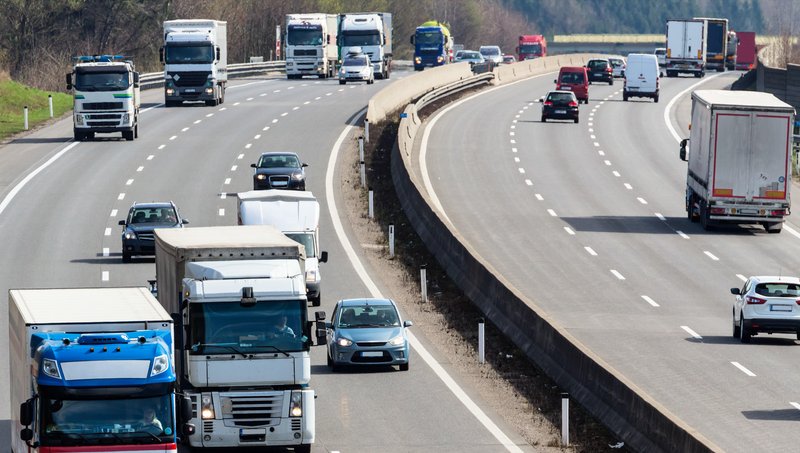Cost Reductions in the Transportation Industry: Greater Efficiency with Continental Technologies
Since December 1, 2023, Germany has increased its truck toll for commercial vehicles weighing 7.5 metric tons or more by introducing a new CO2 surcharge (known as the “CO2 toll”). This additional toll charge will almost double the cost per kilometer driven (from around 19 cents to more than 30 cents). The CO2 value determined for the vehicle’s registration will serve as the basis for the CO2 surcharge and not the values actually generated during its operation. The latter depend on factors such as tire pressure, axle load, exhaust gas purification and fuel tank level.
Since December 1, 2023, the German government has increased the truck toll for vehicles weighing 7.5 metric tons or more by introducing an additional charge known as the “CO2 toll.” This will almost double the toll costs per kilometer compared with the previous level. The goal of this “price signal” is to create a financial incentive for carriers to accelerate the transition to trucks with alternative drive systems (source: German government).
The transition is proving to be a challenge since currently, at the end of 2023, the supply of vehicles required for the upcoming transformation is limited. Faced with this situation, a difficult one for the entire transportation industry, it is all the more essential that other cost factors are optimized and efficiency increased. There are two possible approaches to this. The first involves products for the vehicle itself from key suppliers such as Continental, which can reduce fuel consumption and thereby lower costs. Secondly, there is a great deal of savings potential in data flows and processes within the industry. Continental also offers solutions here. The Hanover-based company is helping the transportation sector to economically fulfill its social responsibility and usher in a lower-emissions future.
A long history: Continental leverages efficiencies in freight forwarding
Since the Kienzle Autograph of 1926 and its successor model the TCO 2 of 1933, the recording of important driving data (accurate time-based logging of speed and rpm) and, from the 1950s onward, working time via the tachograph has been an essential part of Continental’s product portfolio. From the EU tachograph in the 1970s through to the electronic compact tachograph of 1984 in the shape of the round 140-mm industry-standard device, tachographs have always been one of Continental’s strengths.
This continued with the modular MTCO tachograph in 1999. Since 2006, all new vehicles subject to tachograph regulations must be equipped with a digital tachograph. From the DTCO 1.4 model onward, the devices even record driving and rest periods in high resolution to meet the “one-minute rule.” An entire ecosystem of telematics solutions has developed around the DTCO.
This trend recently reached a new peak with the DTCO 4.1, which has been available since June 2023. Continental also plans to launch a tachograph-based toll collection system jointly with toll service provider Axxès in 2024. Together with the plug-in VDO Link and the components already installed in the vehicle, this will give rise to connected onboard equipment (OBE). This DTCO function will render unnecessary the large number of existing onboard units (OBUs), which currently ensure that tolls are paid correctly for transportation across European borders.
Feeding automated processes with vehicle data to save time and diesel
But the so-called tachograph toll is only one potential benefit. Filtered by the tachograph, a high-speed stream of data is produced from the vehicle’s interior. And its potential is just starting to be tapped. Information on the estimated arrival time, for example, which helps the recipient of a truck delivery with planning, can be calculated much earlier and more precisely if the driver’s mandatory rest periods are known with certainty, which is one of the tachograph’s core tasks. Ultimately, this can lead to more efficient route planning and therefore to fewer journeys.
Parking spaces can also be reserved according to the same principle. Motorists on German freeways are familiar with the chaos at service areas and parking lots when there is no longer enough space for the mass of trucks. What many are unaware of is that the drivers are obliged by law to take breaks at specific points on their journey. The “musical chairs” occurring on the parking lots is not only dangerous, but also inefficient. Owing to the lack of parking spaces, breaks are often taken much too early or late. The tachograph, however, knows the exact time for the next break. Information about the next available parking space from another source would enable the driver to roll onto the parking lot at precisely the right time.
But the tachograph helps with more than just driving and rest periods. It can also enhance other vehicle data because the instrument, which is unambiguous as well as tamper-protected in a number of ways, provides legally secure information on which driver/vehicle has transmitted the data. This is a decisive factor where this data forms the basis of a business relationship.
Cloud-based data exchange between vehicles
Thanks to Continental’s eHorizon platform, commercial vehicles “know” when best to let the vehicle coast and when to accelerate early (approaching gradients). This solution takes the topography and layout of the route into account and makes suggestions for a fuel-efficient driving style. It has already helped commercial vehicles save 6 billion liters of fuel and 17 million metric tons of CO2 to date.
Real-time communication rollout in the transportation industry
The ContiConnect solution monitors the air pressure and temperature in tires and communicates them to the driver in real time. Low tire pressure drives up fuel consumption and can cause the tire to heat up and burn, leading to breakdowns with the risk of accidents and lost time. Fuel-saving tire technology such as that of the Conti EcoPlus HD3+ with reduced rolling resistance and outstanding fuel efficiency for long-haul trucks helps to achieve the lowest effective total costs in the fleet. The EcoPlus HD3 has 16% less rolling resistance than its already fuel-efficient predecessor, the HDL2+.
Software for fleet and tachograph management
Continental's commitment extends beyond the vehicle to the entire industry. Its software-based services, for example, allow carriers to improve the efficiency of their processes. Several hundred thousands of vehicles are recorded in systems featuring Continental solutions. The benefits include the following:
VDO Fleet Tachograph Management, which enables the archiving of tachograph data and creation of the corresponding reports. These reports also provide transparency with regard to the causes of inadvertent compliance violations (such as input errors). This is decisive for carriers when preparing for potential operational audits in order to implement countermeasures (e.g. training) aimed at avoiding fines or consequences that can even lead to the withdrawal of licenses. Compliance is in fact a greatly underestimated success factor. VDO Fleet live grants the carrier direct access to a vehicle’s current situation with the aim of analyzing efficiency and even optimizing truck tours that are already in progress through the use of live data.
Facts and figures
- December 1, 2023: Introduction of the CO2 toll for commercial vehicles >7.5 t (= technically permissible maximum laden mass) by amending the German Federal Trunk Road Toll Act (BFStrMG)
- July 1, 2024: Introduction of the CO2 toll for commercial vehicles >3.5 t (= technically permissible maximum laden mass) by amending the German Federal Trunk Road Toll Act (BFStrMG) (does not apply to tradesman vehicles)
- From 2020: EU Mobility Package 1 (compliance with new international transportation regulations aimed at driver protection and accident prevention). This requires the mandatory installation of 2nd generation digital tachographs, e.g. Continental’s DTCO 4.1 in all commercial vehicles driving internationally. By 2026: The latest tachographs will also have to be retrofitted in older vehicles – a first in the EU.
- Since 2005: Fully digital truck toll on freeways in Germany
- 2023: 100 years of VDO tachographs

Valerie Libercka
Media Spokesperson Smart Mobility
Continental Automotive

Ali Parvanta
Spokesperson Innovation & Technology
Continental AG
Find out more about Fleet Management with Continental
Status: December 2023







